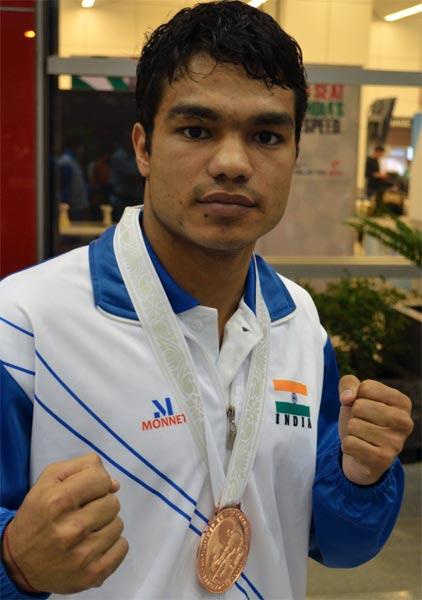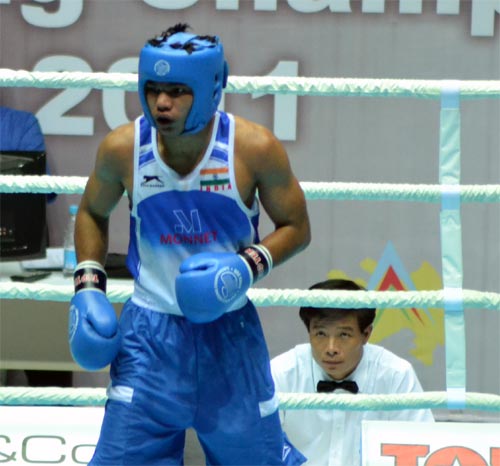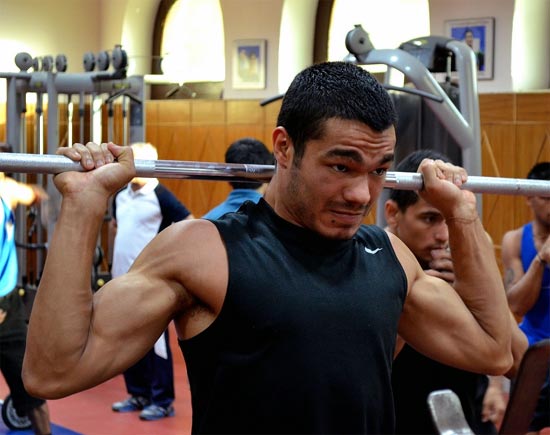
He is one of the most talented Indian boxers in recent times. His distinct approach and intrepid swagger, coupled with speed and the ability to land lightning-fast power-packed punches on his opponents, makes him a serious medal contender at the 2012 London Olympics.
Vikas Krishan Yadav entered the record books when he became only the second Indian boxer to win a medal at the AIBA World Boxing Championships in Baku, Azerbaijan. The tournament also saw him attain qualification to the upcoming Olympics.
In a meteoric career rise, Vikas scaled the heights in the World junior and youth divisions wth gold medals at the 2007 AIBA World Cadet Boxing Championships, 2010 Youth Asian and Youth World Boxing Championships.
He broke early into the senior tour, and in his very first international tournament at the senior level -- the 2010 Asian Games in Guangzhou -- he went on to bag the lightweight title. With that triumph he asserted himself as one of the next generation boxers of India.
In a free-wheeling interview, Vikas talks about his achievements, his transition to the senior tour, his unique technique and preparations for the 2012 Olympics.
Not many people are aware of how exactly you took up boxing. Was it an instinctive choice once you moved to Bhiwani, or was it something you carefully considered?
A variety of factors propelled me to take up boxing as a sport. My fondness for action movies and my friends, who were already into boxing, intrigued me with their conversations about the sport. But the biggest inspiration was my father who always wanted me to lead a fit and healthy life and gave me the freedom to decide my path and encouraged my choice.
Tell us a bit about your training at the Bhiwani boxing club with coach Jagdish Singh. How instrumental was that period in your professional career?
Mr Jagdish Singh is a very determined and able coach. Discipline is of utmost importance to him; he believes there is no substitute for hard work. He himself is a much-disciplined man and has never missed a single practice session, which is what makes our centre a big success.
It was in Bhiwani that I learnt the basics of the sport and started to understand my strengths in the game. I also learnt a lot watching my seniors, like Akhil Kumar practice. My training there provided me a good base to start with, and we all know how important it is to have a sound foundation for a successful future in any sport.
When you started boxing did you ever think you would win a medal in a World Championship some day and be playing in the Olympics?
Not really! I did not ever think about that; I didn't even know much about the World Championships or the Olympics at that time, and never thought that far ahead.
When I started boxing I was 11 years old. My only objective was to defeat my opponent in the ring and I trained hard for it. I have always been a focused lad, and whatever I did, I did will full conviction. I think that comes from my parents.
What was the feeling of qualifying for the London Olympics like? Were you overawed by its gravity?
We all know the magnitude of the Games and the importance it holds for any and every sportsman. With so many boxers looking to be part of the Games, qualification becomes all that more difficult. So it was a big achievement for me to have qualified. I was very happy to be among the handful of athletes who get this chance. But I don't think I am overawed; qualification was a small achievement; there is a long way to go.

After winning the Junior National Championships a couple of times you won your first major title at your very first international tournament, the 2007 AIBA Cadet World Championships. How was that experience?
My first tournaments have always turned out to be lucky for me. Be it at the state, national or international level, I have been fortunate enough to strike gold. Even the 2010 Asian Games it was my first senior international tournament and I won the gold medal. You know these achievements have always been a great motivating factor and the gold at the 2007 Cadet World Championship, being the first one and knowing that it was at the global arena, was something special.
2010 was a great year for you on the international stage. You won the Youth Asian Championship and the Youth World Championship along with a bronze medal at the 2010 Youth Olympics. Then you went on to win the gold medal at the Asian Games. How were you able to maintain such a consistent performance?
That was a good year for me. I had done well at the Youth Asian and the Youth World Championships; before going for the Youth Olympics I had already won the gold medal at the Senior Nationals and was awarded the best boxer title of the tournament.
Playing with seniors and doing exceptionally well gave me a lot of confidence. I thought if I could beat the seniors, juniors would not be that difficult. I was brimming with enthusiasm of playing at the senior level and carried the form into the Asian Games. Also, there was no pressure, as no one considered me to be a threat, which helped me win the gold.
You seemed to have made a habit of doing well in your debut tournaments. What propels you to achieve these feats?
(Smiling) I would love to carry on with this trend and do well at my first Olympics as well. I think, earlier, in the junior and youth divisions I did not put much thought into it; I just got inside the ring and wanted to do well. But now I think it is the fear that drives my performance. I feel some way or the other; it's the fear of not wanting to get hit that makes my defence solid and makes me win.
You had a very smooth transition from the junior to senior level; how did you adapt so easily to challenges and pressures of the senior tour?
Yes, it has been a very smooth transition. I did not have to adapt much or felt pressured at any point of time. I haven't yet encountered a slump or faced any difficulties as such. I guess it comes naturally to me. The only major competition that I have missed was the Commonwealth Games, in which Jai Bhagwan, who had been my main opponent in the light-weight division, played.
From lightweight (60kg) to welterweight (69kg), and that too just two-and-a-half months before the Olympic qualifying tournament, which incidentally was also the World Championships. What prompted you to make that change? How did you deal with it?
Everyone, including my coaches and fellow-boxers, were not in favour of me changing my weight division, but I had made up my mind. I believed I would fit well in the welterweight class. The only coach who supported me was Mr G S Sandhu; he believed that I would do well in the welterweight division.
He said to me, 'If you are good at 60, you can be good at 69 as well,' along with a few other things, that motivated me. Since I was sure about it I did not brood over it too much and made the jump.

You have a unique approach to your game plan. It is said that you focus more on having the perfect defence and work your way from there. Can you tell us more about this style?
Yes, that's exactly how I play my game; that's what I believe is the basis of the sport -- how to defend yourself and hit your opponent more. Meaning, first you have to defend and then counter and that's what I try and follow. I start with a defensive approach and focus on counter attacks.
Basically, I try to puzzle and irritate my opponent with a solid guard, which, at times, gives me easy opportunities to counter attack. It is a simple strategy but works for me; not many have been able to find a way past it.
You have the habit of sometimes raising you hand after landing a punch. What is the reasoning behind that move?
(Smiling).....Well, there is not much reasoning behind it. It is a personal technique that I use to impress the judges and demoralize my opponents. Some boxers tried to emulate it in the senior nationals but it didn't work for them. It can be a bit tricky; therefore, one needs to be absolutely sure of what he is doing.
Have you had to adapt much with the new scoring system, which demands that a boxer is more aggressive?
Once again, after the AIBA brought about the change in the scoring system, people advised me to focus more on offence and get rid of my defensive strategy. But I stuck with it and the approach has been paying off. It's not that I focus too much on my defence and attack less; one has to do both in order to win and I have my own way of doing it.

In an article you once said that chess helps you in boxing. Can you elaborate on that theory?
I don't get much chance to play chess these days as we have a very hectic training schedule. I use to play a lot as a junior and youth boxer. It is a game that sharpens your mind and helps you think ahead; I believe these abilities can help you in preparing your line of attack in boxing as well.
You were battling a wrist injury during the World Championships... how did you cope up with that obstacle?
All thanks to our team doctor, Abhishek Choudhary. He has cured a lot of my small niggles and some major injuries as well and that too in very short recovery time. Boxing is a sport in which injuries are a part and parcel of the game and you are bound to get hurt at some point or the other. A good doctor can make a big difference.
With just about three weeks left for the Olympics, would you say you are on the right track in terms of training and preparation?
Yes, I am very happy with our preparation; we are moving forward with our plans. Soon we will be leaving for a training camp in London ahead of the the Olympics. If all goes well we are sure to return with favourable results.
What are the areas of your focus?
There are bound to more powerful and bigger boxers in my weight. Keeping that in mind I have been focusing on footwork, speed and strength. I want to be able to play the power game, while at the same time move in and out swiftly and work on my strengths.
What can we expect from you at the Olympics?
You can be assured that I will give my very best and, hopefully, with the nations support and blessing, we will achieve our desired objectives.